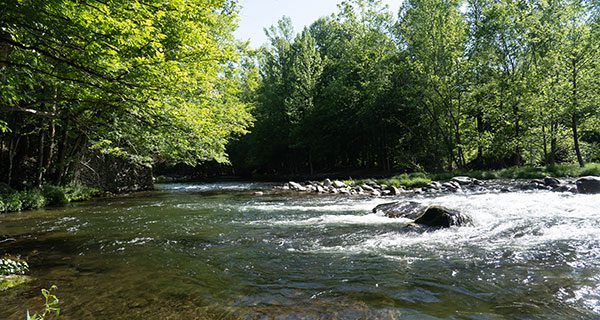
It was called the Dirty Bird due to the color of its water. Poisoned by pollution, some described the water as black as tar. I always considered it more of an unnatural green especially in its impoundment in Waterville Lake, just up the gorge from the Walters Hydroelectric facility. But I only started fishing it about twenty years ago, so I guess the color could have changed.
Another reason for the nicknames was the smell. Old timers would often give directions to the river with the simple saying…” Just follow your nose.” Again, I always associated the bad smell with the paper mill in Canton, North Carolina. I’ve never experienced a bad smell in the water myself, but I imagine nicknames are given for a reason. However, underneath the tainted water and smell, the river survived and the fish held on…”Life finds a way.”
The Canton paper mill, owned by an international packaging conglomerate called Pactiv Evergreen, through pressure from environmental groups like the Dead Pigeon River Council, was forced to spend millions of dollars cleaning up its operations. This was not a panacea. It didn’t fix everything, but it was a start. The water began to clear. The river was still off color, but you no longer thought twice about sticking your feet in it. The ‘stigma’ began to lift. Soon, rafting companies sprang up just downstream of the plant in Hartford Tennessee. Before too long, a dozen or more outfits began floating people down water they once avoided.
On March 6, 2023, Pactiv Evergreen abruptly announced the paper mill would close due to rising inflation and corporate restructuring. This was devastating news to the people of Canton, North Carolina. People lived and worked around the plant for a hundred years. New jobs will have to be found and the towns identity will have to change. This is not an easy task. The atmosphere around Canton will undoubtably get darker for the next few years. My heart goes out to those folks.
But downstream, the Pigeon River, a growing recreation destination for fisherman and river rafters alike, is now aglow with new energy. Property values once depressed are now soaring with anticipation of what’s to come. The future is bright for everyone along its banks. So, let’s focus on why I’m excited about the possibility of crystal-clear water in the Pigeon River: the fishing.
The water in the headwaters of the Pigeon is pristine. I’m giddy with the thought of this same water running unimpeded through Canton alongside and under I-26 and into Waterville Lake, through the power plant before being pumped into the bigger water running through Cocke County, Tennessee.
The state record smallmouth (over 11 pounds) is well within reach from these waters. The Pigeon consistently produces huge smallmouth. It has a much narrower river base than other rivers like the French Broad or Nolichucky. It provides a dense smallmouth population in less water. More smallmouth, less water…you don’t have to be a genius.
The Tennessee side of the pigeon river also has 15 miles of “trophy smallmouth” water, where no bait fishing is allowed. And smallmouth is not the only species you can target in the Pigeon. Walleye, Trout, Crappie and even Pike are caught on a regular basis. This river could easily gain the same stellar recognition other streams in Tennessee have garnered like the Holston and the Clinch.
I would be remiss if I didn’t talk about river access. The rise and flow of water levels due to power generation, advantageous to rafting companies, can make fishing from a raft very difficult. It can also be downright dangerous to be in the water when generation starts. Do yourself a solid and get very familiar with power generation schedules or better yet, hire a local guide familiar with the ebb, flow, and rock formations of the stream bed. There are several put in locations and little homework will go a long way.
The Pigeon River is a testament to the resiliency of nature and the hardy souls living along its banks. Now is the time to get out and explore it.